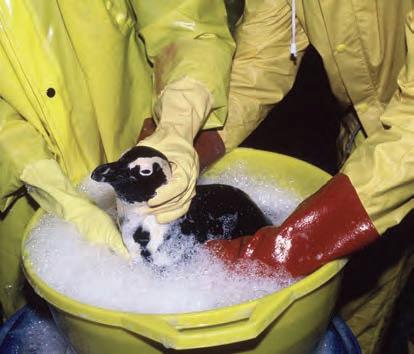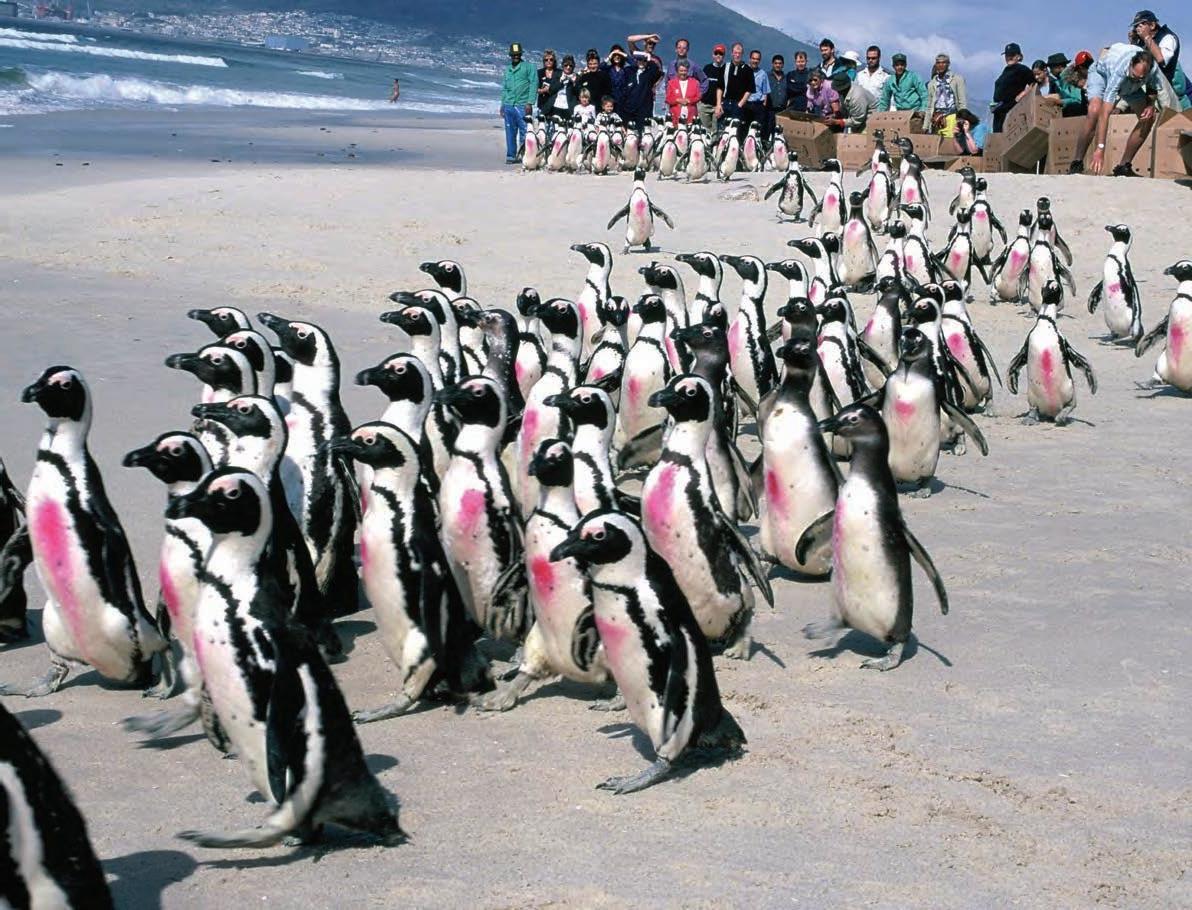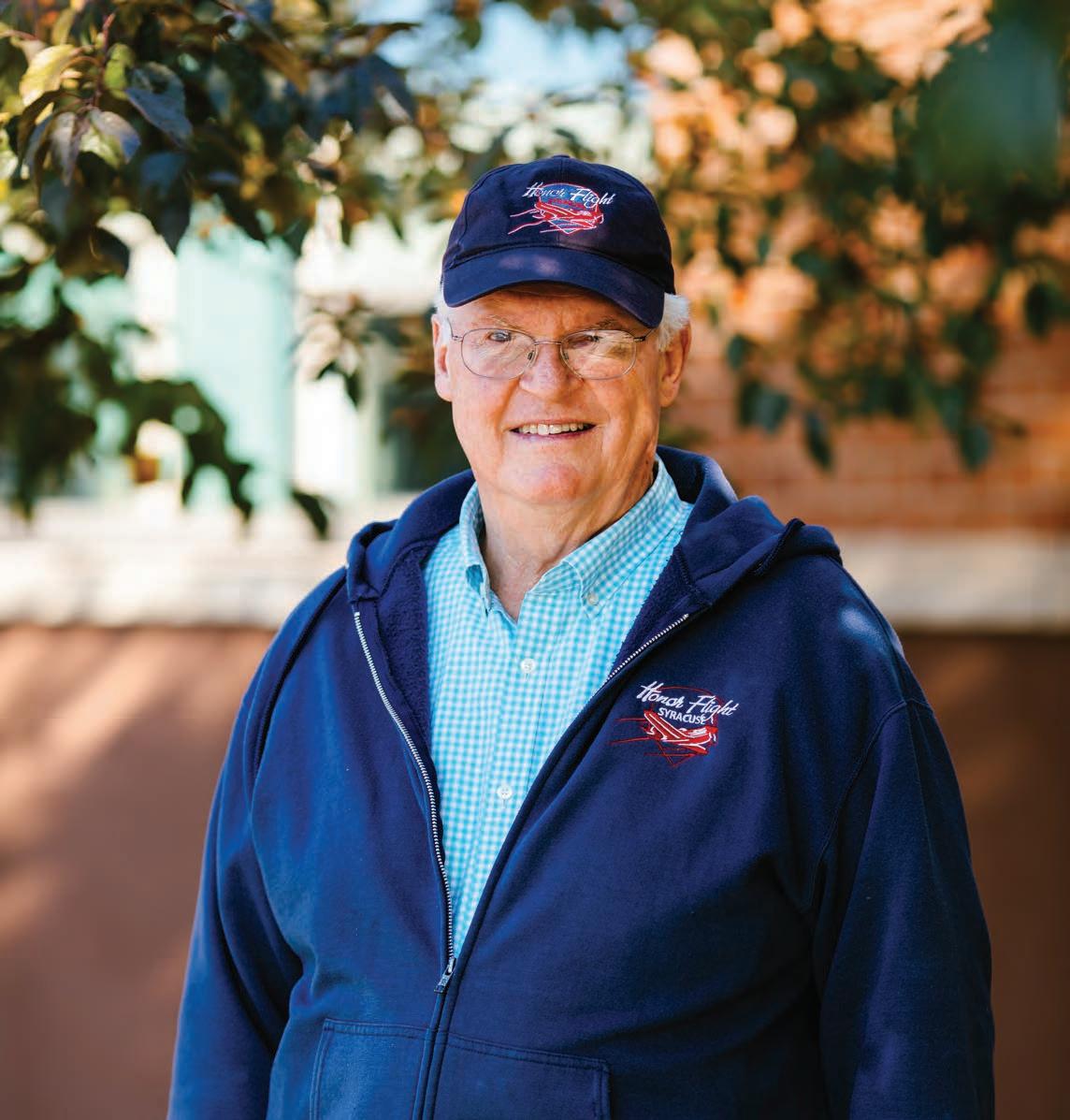
10 minute read
A PASSION FOR
A king penguin bites Dyan deNapoli’s camera lens in Gold Harbor, South Georgia Island, in 2019
A PASSION FOR SAVING PENGUINS
Author and wildlife expert Dyan deNapoli ’79 advocates for a greener planet
BY WENDY LOGAN ’80
wenty years ago, Dyan deNapoli ’79 was on the front lines of the largest wildlife rescue e ort in history. A penguin aquarist at Boston’s New England Aquarium, she was called to Cape Town, South Africa, to join the world’s foremost experts and thousands of volunteers in their e orts to save the lives of 20,000 oiled African penguins.
The birds—covered in thick, black oil—were victims of a spill by the tanker MV Treasure that had dumped 400 tons of bunker fuel into the sea. Six years earlier, after a similar spill, rescuers were able to save only half of the 10,000 oiled birds. But this time, because of lessons learned from the past, more than 90 percent were saved and successfully released back into the wild.
A 21st-century environmental warrior, deNapoli has continued to evolve her work on behalf of penguins and the planet in the ensuing years, following a career path that seems predestined, if less than direct. For one thing, it was supposed to be about dolphins. “Working with dolphins was my dream since the age of five when I was obsessed with Flipper,” she explains. A painfully shy young girl with cat-rimmed glasses and an overprotective mother, deNapoli says it was her time at Williston that gave her the first inklings of autonomy “because it was a place where, for the first time, I really had a sense of independence. Independent thought and selfactualization were encouraged. You were urged to excel and be thoughtful. I enjoyed the intellectual stimulation of the classes in a way I hadn’t in my public school. Williston helped me learn to be responsible for myself. It was my first baby step into adulthood.”
After college, though, deNapoli was somewhat at loose ends. “I didn’t think it would be possible to work with dolphins. The only career choice back then was being a veterinarian, and math and science were not my strong suit.” By age 30, she still hadn’t quite figured out her plan. An Earthwatch expedition to the Kewalo Basin Marine Mammal Lab, in Oahu, Hawaii, a birthday gift from her parents, helped give her a goal.
“I spent a month there working with dolphins and, at the end of it, I was deliriously happy. I have to do this, I thought.” But the next step was to try to secure a coveted internship at Kewalo Basin, and deNapoli would have to go back to school to work on a related degree (she chose animal science). “And there was no guarantee if I did that and applied that I would get it. But I knew in that moment that I did not want to get to the end of my life, look back, and know I didn’t try. That’s when I developed that mantra.”
The mantra is one she uses as part of her inspirational TEDx talk: “Someone has to get that cool (internship/job/gig). It might as well be me.” And it worked for her. “It was the best summer of my life,” she says.
After those four months in Hawaii working with her beloved dolphins, deNapoli returned home to the Boston area to continue her college studies.
GET TO KNOW A PENGUIN
Why they walk funny
They have knees! Penguins keep their knees bent at a 90-degree angle. They are essentially squatting all the time, which is why they waddle.
Why you should keep your distance
Penguins may be cute, but they are not cuddly. In fact, penguins can be rather ornery, and their sharp beaks can do a lot of damage when they attack.
Why they aren’t responding to you
Penguins have a level of intelligence that deNapoli compares to that of cats. They can be trained, they can learn to know their names, and they may respond when called…if they feel like it. Or, they can turn and look at you over their shoulder and swim away. They choose to interact or not.
What they are trying to tell us
Penguins are an indicator species. Their plight represents a microcosm of the threat posed by climate change. In 2010, when deNapoli published The Great Penguin Rescue, African penguins were already listed as endangered. Their population has declined by 99 percent over the last century.
Why they are in trouble
Of the 19 species of penguins on earth, 15 are threatened or endangered. The main causes for their decline are climate change and overfishing. Some 90 percent of the world’s oceans have been overfished.
In her senior year, she took a full-time internship working with penguins at Boston’s New England Aquarium. After earning her degree, she had to decide whether to stay on at the aquarium, or pursue her dream of working with dolphins in either Hawaii or the Bahamas. In the end, concern for her aging parents kept her in the Boston area. She first volunteered and then was hired as a penguin aquarist at the aquarium, eventually taking over the senior role. “I never in a million years could have predicted what would come from that decision to choose penguins,” she says, “but in hindsight, it was the right one.” In fact, both her parents would need her support, and it was at the New England Aquarium, in June 2000, that she received the desperate call for help from South Africa.
Since the rescue, deNapoli has become an author, educator, and world-renowned expert in her field, trademarking herself as the Penguin Lady. In June 2011, she presented a TEDx Boston talk (one of four TEDx talks she has given) about the rescue that’s Treating a victim of been viewed nearly half a million times. She has also written and narrated an animated TED-Ed video on penguin conservation for students. She’s shared her experiences at grade schools and universities, libraries, museums, and assisted living communities. She’s been a guest lecturer for National Geographic, and served as a penguin expert on expeditions to Antarctica.
But in recounting the story of the rescue, even after all these years, the cheerful, positive, and dedicated Penguin Lady is briefly brought to tears. She is back in Cape Town, experiencing the emotions she could not indulge in that moment. As with medics in a war zone, deNapoli says there was simply no time to process it all. “I can talk about the penguin rescue 50 times without getting emotional. Then, without warning, during the 51st time, I suddenly get all choked up,” she explains. “Even after 20 years, it still catches me o guard when it happens. My friends and colleagues who were there have the same experience. It’s rather astonishing, really, that the emotions from something that happened 20 years ago can still remain so close to the surface.”
She continues: “But here was this massive warehouse, packed full of 16,000 of the 20,000 oiled penguins from the initial rescue. These are always very noisy birds, and I had this expectation of a cacophony of noise when I walked in. And it was shocking to see them all, dripping with black oil, completely silent. It’s devastating, but you have to push down these intense emotions because if you let them come to surface, you know you won’t be able to do the work. This was no time to let fear or uncertainty overwhelm us. I thought, ‘I can’t let myself feel this right now. I’ll fall apart and won’t be able to do this massive task that’s being asked of me.’”
On the trip home, 12 pounds lighter, thoroughly exhausted, having worked almost around the clock for three solid weeks, she had an epiphany. “I always had a deep connection with animals, and I always thought I would do something for them on a large scale. I didn’t know what that would look like, but I always felt that was what I was here to do, to help them somehow. And I had this moment coming back on the plane from Cape Town after three weeks knee-deep in oiled penguins, and I remember thinking, ‘If the plane goes down right now and this is the end of my life, I’m OK with that. I feel as though I’ve just done what I came here to do. I’ve fulfilled my destiny.’ It was humbling and powerful. That rescue was a pivotal moment in my life.”
Still, when she returned, she was haunted by a form of PTSD common to those involved in such life-or-death undertakings. For a time, each morning in the moments just before waking, she’d find herself panic-stricken by a vision of her apartment filled wall to wall with oiled penguins. The dreams subsided, but on the job she felt disengaged. “To have spent this intense three weeks in a constant, heightened state of stress, with a singular focus to save a species…everything else seemed meaningless and pointless in comparison.” Fortunately, her passion for her work returned after

a few months. Then, after losing her mother in late the Treasure oil spill
STEPS TO REDUCE YOUR CARBON FOOTPRINT (AND SAVE THE PENGUINS)
1Know the policies of 2When ordering items online, 3Vote for leaders who 4Be mindful of what you 5Support or volunteer at 7 Reduce, reuse, recycle. Like the businesses choose a local back policies eat: Patronize an animal rescue drops in the ocean, you support and supplier whenever that protect the local farmers center. every little bit whether they are possible. Shorter environment and and choose only helps. committed to sustainability and shipping distances translate to less animals. Hold your elected sustainably caught seafood. 6Buy electric automobiles. recycling pollution. representatives accountable.
2004, deNapoli knew it was time for a change. She decided to leave the aquarium, retreat for a while, and heal, before determining her next step.
While she knew it was unlikely she’d experience anything as intense as the rescue, deNapoli says she felt strongly that there was more she could do, even if she wasn’t entirely sure what form it would take. A workshop designed to help people make a living at doing what they love brought it all together. She would take her “penguin show” on the road, teach about penguin biology, talk about the rescue, and shed light on the very real perils faced by penguins and all of earth’s creatures due to climate change. She gave her first public presentation in December 2005.
Since they are an indicator species, the health of penguins portends the health of the oceans. Today, penguins are starving. The primary reasons are global warming and overfishing, and the resulting massive decline in penguin populations is a warnthe e orts of the scientists and 12,000 volunteers, African penguins were placed on the endangered list. “It was so disheartening. After all that work, to have the population so precipitously crash. I couldn’t help wondering how many of the 18,000 that we saved were now dead because of starvation.”
Nonetheless, deNapoli’s mission to save the species continues. She donates 20 percent of proceeds from her award-winning 2010 book, The Great Penguin Rescue, and from her many appearances, to groups working on penguin rescue, research, and conservation. She says that Senegalese conservationist Baba Dioum best summarizes what drives her: “In the end, we will conserve only what we love, we will love only what we understand, and we will understand only what we are taught.” Marked with a temporary pink dye that helps researchers track them, cleaned

ing, she says. Just 10 years after the Treasure spill and
penguins are released back to the wild
THE PENGUIN LADY’S LATEST BOOK
Author of the award-winning 2010 book for adults, The Great Penguin Rescue, Dyan deNapoli recently published her first children’s book, All About Penguins: Discover Life on Land and in the Sea, an illustrated, nonfiction introduction to penguin ecology for 4- to 8-year-olds. Look for it at Amazon and Barnes & Noble. On social media, deNapoli can be found as The Penguin Lady. For more info, visit www.thepenguinlady.com.










